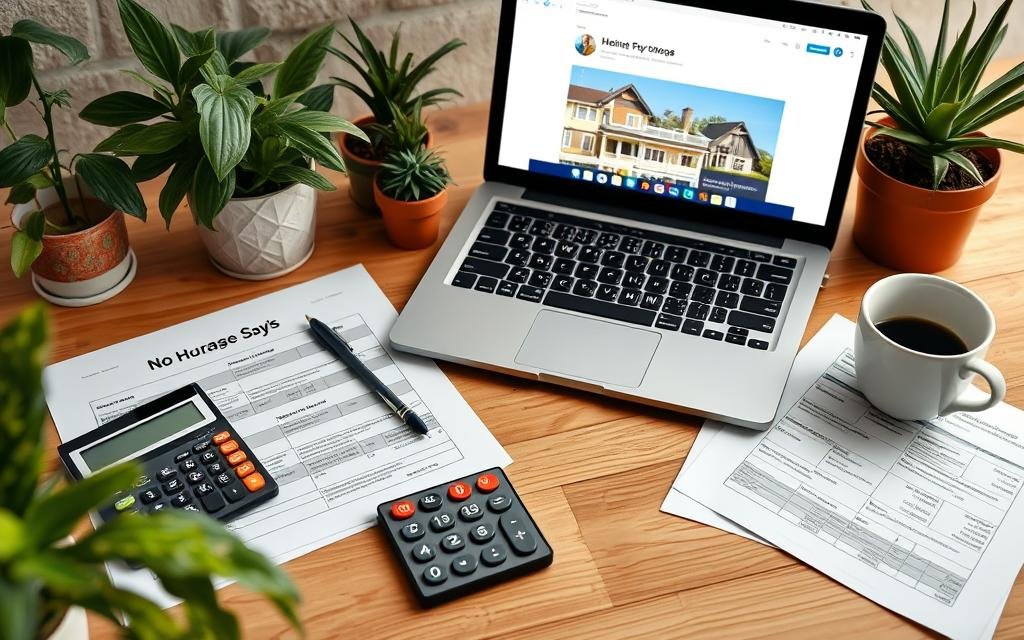How to Search House Listings: Tips for Homebuyers

Starting our journey to find our first home is both exciting and a bit scary. We have to navigate the real estate market, check our finances, and make smart choices. But with the right help and determination, we can turn our dream of owning a home into a reality.
In this detailed guide, we'll cover the key steps to house hunting and finding the perfect home that fits our needs and budget. We'll look at how to check our finances and use many tools and resources. This will help us feel confident as we explore the real estate world.
This guide is for both new and experienced buyers. It offers valuable insights and practical advice for making good choices during the house hunting journey. Let's start this exciting part of our lives and find the perfect real estate search home.
- Understanding Your Home Buying Readiness
- Setting a Realistic Budget for Your Home Purchase
- How to Search House Listings: Essential Tools and Resources
- Getting Pre-approved for a Mortgage
- Working with Real Estate Professionals
- Navigating Different Types of Home Listings
- Creating Your Must-Have Features List
- Understanding Property Documentation and Disclosures
- Making Competitive Offers in Today's Market
- Finalizing the Purchase and Closing Process
- Post-Purchase Considerations for New Homeowners
Understanding Your Home Buying Readiness
Buying a home is a big step. It's important to check if you're ready. Getting your finances in order is key for a smooth home buying journey. Let's look at three important things: checking your financial health, thinking about the long-term, and saving for emergencies.
Assessing Financial Stability
Look at your money situation closely. Are you working to pay off debts? A good credit score can get you a better mortgage rate. Also, try to save at least 20% for a down payment to avoid extra monthly costs.
If 20% is too hard, look into special loans or programs for first-time buyers.
Evaluating Long-term Commitment
Being a homeowner means making a big commitment. Think about your job and income. Will your life and needs stay the same in the future?
Consider if you can handle the costs of owning a home. This includes property taxes, upkeep, and insurance. These costs can add up and affect your financial preparation and mortgage readiness.
Building Emergency Funds
- Experts say save 3-6 months' worth of expenses before buying a home.
- This money helps with unexpected costs like job loss or medical bills. It keeps you from missing mortgage payments.
- Having an emergency fund shows you're financially responsible. This can make lenders happy.
By focusing on these areas, you'll be ready to decide if buying a home is right for you. Checking your finances, thinking about the future, and saving for emergencies will help you buy a home without stress.
Setting a Realistic Budget for Your Home Purchase
Buying a home requires a realistic budget. The 25% rule is a good guideline. It means your monthly housing costs should not be more than 25% of your take-home pay. [https://tipslends.com/questions-to-ask-when-buying-a-house-a-comprehensive-list/]
This rule helps keep your home affordability in check. It ensures you can handle your housing expenses without financial strain.
Remember, there are more costs than just mortgage payments. You'll also need to budget for maintenance, utilities, and closing expenses. Saving 3-4% of the home's price for closing costs is a good idea. This covers fees like appraisal and title insurance.
Getting preapproved for a mortgage is also key. It helps you understand your budget better. By comparing offers from different lenders, you can find the best mortgage payments for you.
| Expense | Percentage of Monthly Take-Home Pay |
|---|---|
| Mortgage (Principal and Interest) | Up to 25% |
| Property Taxes | Varies by location |
| Homeowner's Insurance | Approximately 0.5-1% |
| HOA Fees (if applicable) | Varies, but can be $50-$500+ |
| Maintenance and Utilities | Approximately 5-10% |
The real estate market is always changing. In 2023, the market cooled down, and housing costs rose due to high mortgage rates. By following these tips and getting preapproved, you can make a smart budget. This way, you can buy your dream home with confidence.
"Careful budgeting and financial preparation are essential for a successful home purchase in the current real estate climate."
How to Search House Listings: Essential Tools and Resources
Starting your home buying journey? The right tools and resources can make a big difference. You'll find everything from online real estate sites to mobile apps and local MLS databases. These tools will help you find your dream home faster.
Online Real Estate Platforms
Platforms like Zillow, Realtor.com, and Redfin are key for homebuyers. Zillow has a huge user base and lots of property info. Realtor.com gives you deep insights into neighborhoods. Redfin offers virtual tours and map searches, so you can really see each property.
Mobile Apps for House Hunting
- Trulia: Gives you local info on crime, schools, and commute times.
- Homes.com: Has search tools and a snapshot feature for quick info.
- Apartments.com: Focuses on apartments with 3D tours, great for renters.
Local MLS Databases
MLS databases through real estate agents offer the latest listings. This gives you an edge in competitive markets.
"The key to a successful home search is leveraging the right tools and resources. By combining online platforms, mobile apps, and MLS access, you'll be well on your way to finding your dream home."
Getting Pre-approved for a Mortgage
Getting pre-approved for a mortgage is the first big step in buying a home. A lender checks your financial info, like your credit score and income. This shows how much you can borrow and proves you're a serious buyer.
It's key to look at different loan options, like conventional and FHA loans. Each has its own rules and benefits. A 15-year fixed-rate conventional loan is often the best choice because of its good terms and rates.
Before you apply, check your credit score and fix any problems. A better score means lower interest rates. Also, have all your financial documents ready to make the process smoother.
"Getting pre-approved for a mortgage is a critical first step in the home-buying process. It not only gives you a clear understanding of your borrowing capacity but also demonstrates to sellers that you're a serious and qualified buyer."
After you're pre-approved, you'll get a letter from the lender. It shows how much you can borrow and the interest rate. This lets you start looking for homes, knowing you're ready to make an offer.
Keep your finances stable after getting pre-approved. Don't make big purchases or change your credit until you've bought your home.
Working with Real Estate Professionals
Starting your home buying journey? A good real estate agent can be a game-changer. They know the local market inside out and guide you through the buying process. It's important to choose someone you trust and who fits your needs.
Choosing the Right Agent
Start by asking friends, family, or coworkers for agent recommendations. Look for agents with lots of experience in your area. Those with special certifications, like CRS or ABR, show they're serious about their work.
When you meet agents, ask about their communication style and how they negotiate. A great agent is quick to respond, proactive, and fights for you.
Understanding Agent Responsibilities
A buyer's agent does a lot, like finding homes, showing them to you, and negotiating. They also share insights on neighborhoods and market trends. This helps you make informed decisions.
| Key Responsibilities of a Buyer's Agent |
|---|
| - Searching for and identifying potential properties that match your criteria |
| - Scheduling and accompanying you on property showings |
| - Negotiating the purchase price and terms on your behalf |
| - Guiding you through the contract and closing process |
| - Providing insights into neighborhoods, market trends, and property issues |
Communication Best Practices
Good communication is key in real estate. Talk to your agent about how often you want to communicate and how. A good agent keeps you updated and answers your questions.
"A good real estate agent can be the difference between a smooth and stressful home buying experience. Take the time to find someone you trust and who will advocate for your best interests."
As homebuyers, we must learn about the many types of homes out there. We can choose from single-family homes, condos, townhouses, and more. Each has its own benefits and things to think about. Knowing these differences helps us pick the right home for us.
Choosing between new homes and older ones is important. New homes offer custom features and the latest tech. But, they might cost more and take longer to build. Also, foreclosures and short sales can be cheaper but come with extra risks.
When looking at homes, think about upkeep, resale value, and how well it fits your life. Understanding these points helps us confidently find the home that's just right for us.
Property Types to Consider
- Single-family homes
- Condominiums
- Townhouses
- Multi-family properties
New Construction vs. Existing Homes
- Customization and modern amenities
- Potential for higher prices and longer timelines
Foreclosures and Short Sales
- Lower prices but additional risks and complexities
- Thorough due diligence is essential
Understanding the differences in homes helps us make a smart choice. Whether it's a single-family home, condo, or a foreclosure, knowing the pros and cons is key. This way, we can find the home that's perfect for us.
"The key to navigating the housing market is to understand the unique characteristics of each property type and make a decision that fits your needs and budget."
Creating Your Must-Have Features List
When you start looking for a home, making a list of what you need is key. This list helps you focus and find a home that fits your life and goals. Let's look at how to pick the right features and how they affect your home's value later.
Priority Features vs Nice-to-Have Amenities
First, list the things you can't live without, like how many bedrooms or a backyard. These are your must-haves for now and the future. Then, think about what you'd like but can do without, like a fireplace or a certain style. Remember, you might have to give up on some of these extras because the perfect home is hard to find.
Location Considerations
The place where your home is located matters a lot. Look at commute times, schools, and nearby shops and parks. Think about how these things fit into your life. For example, if you hate long commutes, look for homes close to work or public transport.
Future Resale Value Factors
Think about how your home might do in the future market. Look at neighborhood trends and what might make your home more valuable later. Choose features that will stay popular, like a nice exterior and energy-saving systems. This way, you make a choice that works for you now and in the future.
| Feature | Priority Level | Importance for Resale Value |
|---|---|---|
| Number of Bedrooms | Must-Have | High |
| Backyard | Must-Have | Medium |
| Fireplace | Nice-to-Have | Medium |
| Home Office | Nice-to-Have | High |
| Proximity to Amenities | Must-Have | High |
"The most important thing is to create a list of your must-have features and nice-to-have amenities, and then be prepared to compromise on some of the secondary factors to find the right property that aligns with your long-term goals."
Understanding Property Documentation and Disclosures
Buying a home is a big deal. It's important to check all the documents carefully. This ensures you make a smart choice. The seller's disclosure is key, showing any known problems with the property. We'll explore why these disclosures matter, along with the role of home inspections and title searches.
The seller's disclosure is a legal form. It tells you about any issues with the property. This could be structural, mechanical, or environmental problems like mold or pests. Reading this document well can help you spot problems and talk about repairs or price changes.
Conducting a Comprehensive Home Inspection
Along with the seller's disclosure, a detailed home inspection is vital. It finds hidden problems the seller might not know about. This includes checking the structure, electrical systems, plumbing, and appliances. Knowing the home's condition helps you decide if you should buy it or ask for repairs.
Performing a Title Search
Another important step is a title search. It checks for any liens, disputes, or issues with the property's title. This step helps avoid legal or financial problems later.
By carefully reviewing documents, doing a thorough home inspection, and checking the title, you can make a smart choice. This way, you avoid surprises after buying the home.
| Disclosure Requirement | Description |
|---|---|
| Seller's Property Condition Disclosure | Reveals known defects or issues with the property, such as structural problems, mechanical systems, or environmental concerns. |
| Lead-Based Paint Disclosure | Required for homes built before 1978 to disclose the presence of lead-based paint and associated hazards. |
| Methamphetamine Contamination Disclosure | In Utah, sellers must disclose if a property has been used for the manufacture, storage, or use of methamphetamine. |
"Over-disclosing is often better than withholding information, as it can prevent future legal consequences for the seller."
Making Competitive Offers in Today's Market
In today's competitive housing market, making a winning bid is key for homebuyers. Chicago-area real estate agent David Dominguez says that if a house stays on the market long, buyers might offer 5% to 10% less than the asking price. To win, it's vital to work with your agent to create a smart bidding plan.
One smart move is to include an escalation clause in your offer. This clause lets your bid go up automatically if someone else offers more. This is especially helpful in markets where bidding wars are common. Also, knowing when to waive financing or inspection contingencies can make your offer more attractive.
Writing a personal letter to the seller can also help. It shows your excitement for the property and your commitment to the deal. This personal touch can set your offer apart from others.
To succeed, make sure your offer is well-informed about the market and comparable sales. This way, you avoid overpaying and show you're a smart buyer. By using smart bidding strategies, negotiating offers, and managing contingencies, you can find your dream home in today's market.
| Statistic | Insight |
|---|---|
| 19% of agents indicate that unexpected issues found during a home inspection are a top deal-breaker for buyers. | Waiving inspection contingencies strategically can make an offer more appealing, but it's important to understand the risks involved. |
| Pricing just below market value can potentially attract 75% to 90% of potential buyers, while pricing above market value may limit the buyer pool to as low as 10%. | Pricing a home competitively is crucial to attract the maximum number of potential buyers and increase the likelihood of receiving a winning offer. |
| In a cooler market with greater inventory, it is less likely for buyers to purchase homes above the asking price, according to the National Association of Realtors' 2023 Profile of Home Buyers and Sellers. | Market conditions play a significant role in determining the appropriate bidding strategy, with buyers having more negotiating power in a cooler market. |
"It's essential to understand specific market dynamics and adjust the pricing strategy accordingly."
Finalizing the Purchase and Closing Process
The end of the homebuying journey is near. It's time to finalize the purchase and go through the closing process. This stage needs careful preparation and attention to detail for a smooth transaction.
Before the closing date, we'll do a final walk-through of the property. This check ensures the home's condition hasn't changed and agreed-upon repairs are done. We'll also look over all the necessary documents, like the closing disclosure, to understand the closing costs and make sure we have the funds.
The closing process involves signing many documents, such as the mortgage and bill of sale. It's crucial to review these documents carefully and ask any last-minute questions. Depending on the state, having legal representation at the mortgage closing might be required.
After signing all the paperwork and transferring funds, the property's ownership will be transferred to us. We usually have about 60 days to move in, as agreed in the contract or by the lender.
By being organized, diligent, and proactive, we can confidently complete the closing process. With the right preparation and guidance, this final step will be exciting and smooth.
Post-Purchase Considerations for New Homeowners
As new homeowners, we're starting an exciting journey. We'll face both rewarding moments and big responsibilities. One key task is to learn about home maintenance and upkeep.
Creating a maintenance schedule is a good idea. It helps us remember to do things like change air filters and check smoke detectors. We also need to service our home's systems regularly.
It's important to plan for property taxes, insurance, and unexpected costs. Homeowners usually spend 1% to 4% of their home's sale price on maintenance and repairs each year. Saving money for homeownership can help us deal with any problems.
We should also get to know our local utility providers and set up services like electricity and internet. If our home is in an HOA, it's good to know the rules. Finally, organizing our home purchase documents is crucial for easy access to them.
If you want to know other articles similar to How to Search House Listings: Tips for Homebuyers You can visit the category House for Sale.



Deja una respuesta